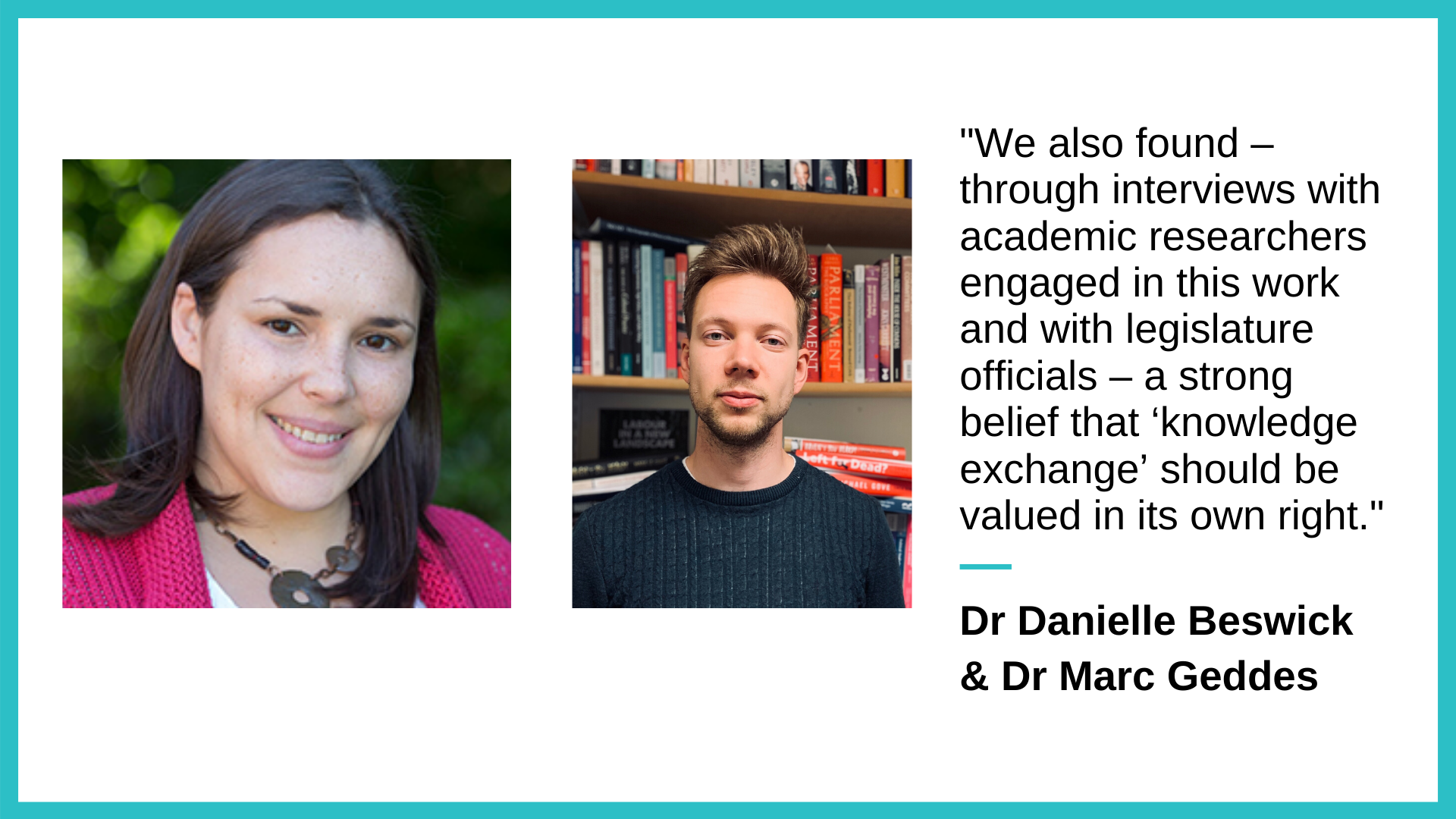New report on academic engagement with UK legislatures
Posted 2020-04-06 10:35:55 by Dr Danielle Beswick and Dr Marc Geddes

The authors have recently published the report, Evaluating academic engagement with UK legislatures, a project which is funded by the ESRC IAA and supported by the UK's four legislatures.
From 1 March 2020, UKRI no longer requires grant applications to include a two-page Pathways to Impact statement, nor an Impact Summary. This does not, however, mean an end to policy engagement for academics; UKRI have stated that the impact agenda remains ‘vital’ to utilise knowledge for public benefit. Indeed, the Research Excellence Framework (REF) and Knowledge Exchange Framework (KEF) remain in place, and provide incentives for legislatures to continue to develop and strengthen links with higher education institutions (HEIs).
In summer 2019, we began an ESRC-funded knowledge exchange project, exploring how the UK Parliament, Scottish Parliament, Northern Ireland Assembly and National Assembly for Wales interact with academics. Specifically, we focused on their strategies and activities for promoting knowledge exchange, by which we mean a two-way process that brings together university-based and policy-based officials to exchange their ideas and expertise for the benefit of research and policy activities. We found that, though the breadth and depth of activities varied across legislatures, they are all underpinned by a recognition that academic research brings particular advantages to the work of legislatures, distinct from and complementary to that which may emerge from, for example, think tanks or civil society.
We also found – through interviews with academic researchers engaged in this work and with legislature officials – a strong belief that ‘knowledge exchange’ should be valued in its own right; i.e. as more than simply a conduit towards or process for achieving impact. This is because KE has benefits that go beyond merely REF-defined impact, to which it is often linked; rather, KE allows legislatures to widen their evidence base and enhance their capacities, while academics are able to contribute to policy debates, learn about legislatures and enhance their professional skills.
This not only means that we must be careful in defining knowledge exchange but also identifying how we can understand successful knowledge exchange between universities and policy organisations. Moving away from a focus on outputs and impact, we argue that successful KE depends on creating a healthy environment for it to occur, and suggest that we can evaluate this through examining legislatures’ and HEIs’ attempts to overcome barriers often associated between academic-policy engagement. We therefore suggest that an engaged university and engaged legislature displays the following key characteristics:
- An engaged university: permits and supports fellowships with legislatures; has staff who are committee advisers; allocates dedicated staff time within workload models or other arrangements to facilitate KE; has staff who submit evidence to legislatures and participate in committee hearings; recognises and supports KE in its own right, not solely as a way to achieve impact; has dedicated internal funding opportunities for KE; hosts inward secondments and supports outward secondments; appoints officials from legislatures to steering groups and/or advisory boards; co-authors publications with legislature staff; recognises KE in workload models and in criteria for promotion; and, submits funding bids which include legislative staff as partners.
- An engaged legislature: has a clear KE strategy; actively engages with universities and professional associations to disseminate opportunities for engagement; shares expertise on KE with other legislatures; has dedicated staff time allocated to pursuing and improving KE activities; curates a range of activities to engage academic researchers at different career stages, from different institutions, and from different backgrounds; provides appropriate recognition of academic participation in KE activities; and, monitors characteristics of those participating in KE activities.
Throughout our project, we found many examples of good practice that facilitated effective knowledge exchange at all four legislatures. Project participants also raised challenges to current KE practices, both at universities and at legislatures, which echo previous findings and which we synthesised into our report (e.g. the research by Kathryn Oliver and colleagues, and which continues to be debated).
What does this mean for HEIs? While our project recommendations focused predominantly on how legislatures can improve their KE strategies, this is not possible without efforts by universities, too. In particular, we argue that HEIs should:
- Support legislatures in building awareness of university research cultures through, for example, secondments, short periods shadowing KE professionals and roundtable discussions;
- In collaboration with legislatures, draft, develop and publicise a list of ways in which knowledge exchange can be clearly acknowledged to academic staff and researchers;
- In collaboration with legislatures, develop clear messages for internal and external audiences about the benefits of KE activities; and,
- Increase their funding and resources available to fully and holistically embed KE activities across relevant business areas.
Some of these may sound familiar, and resonate with the Universities UK draft Concordat for the Advancement of Knowledge Exchange in Higher Education in England (click here for a PDF of the Concordat).
In recent years, legislatures across the UK have strengthened their engagement with universities to enhance their capacities to scrutinise policy and contribute to law-making in the most effective way possible. We hope that universities seize the opportunity to enhance their own contributions to knowledge exchange.
Our report, Evaluating Academic Engagement with UK Legislatures, is out now and can be found here: http://www.pol.ed.ac.uk/research/grants_and_projects/current_projects/evaluating_academic_engagement_with_uk_legislatures
Dr Danielle Beswick a Senior Lecturer in the International Development Department at the University of Birmingham. Her current research interests are primarily centred on UK-Africa relations, UK development policy and international volunteering by political party members. Follow Danielle on Twitter: @drdbeswick.
Dr Marc Geddes is Lecturer in British Politics and Associate Director for Research, Knowledge Exchange and Impact at the School of Social and Political Science, University of Edinburgh. He has recently published a book on how MPs and officials interpret ‘scrutiny’ and ‘evidence’ in the UK Parliament. Follow Marc on Twitter: @marcgeddes.










































































































